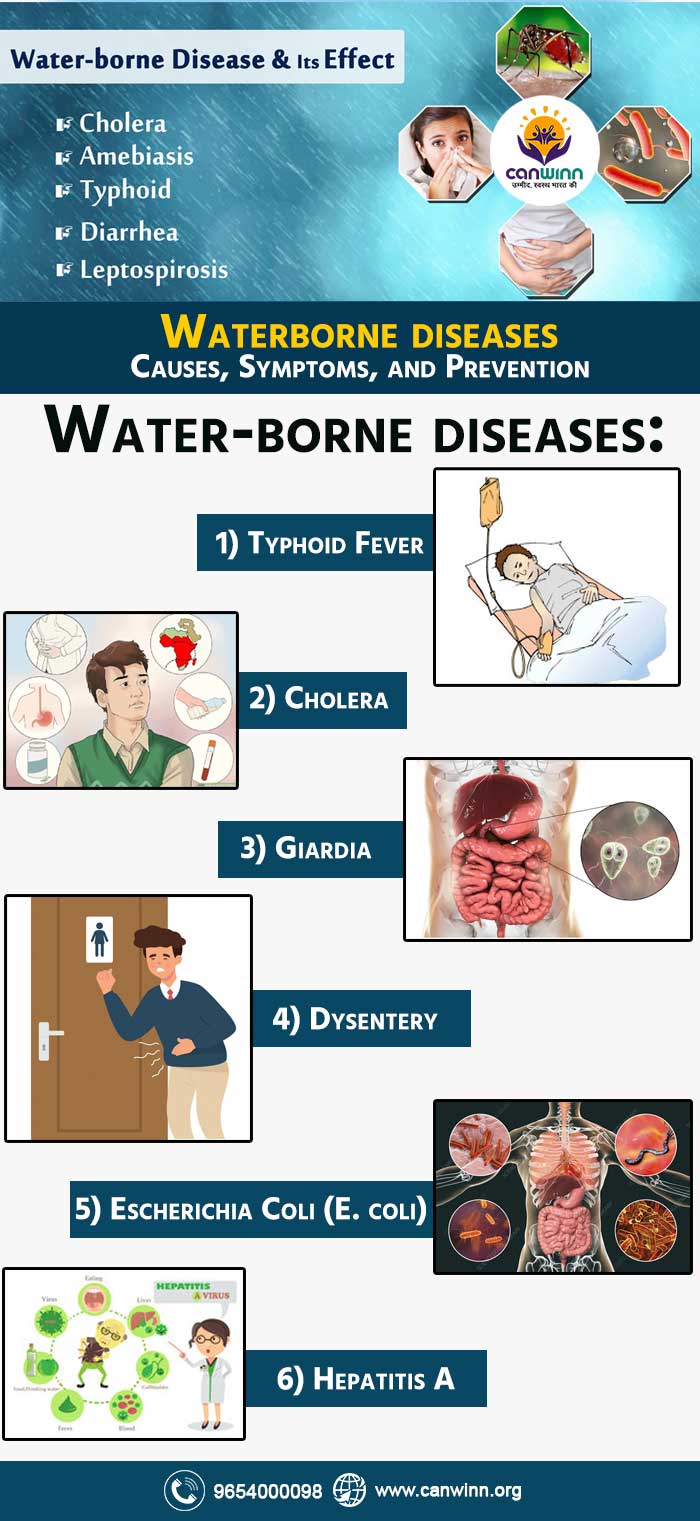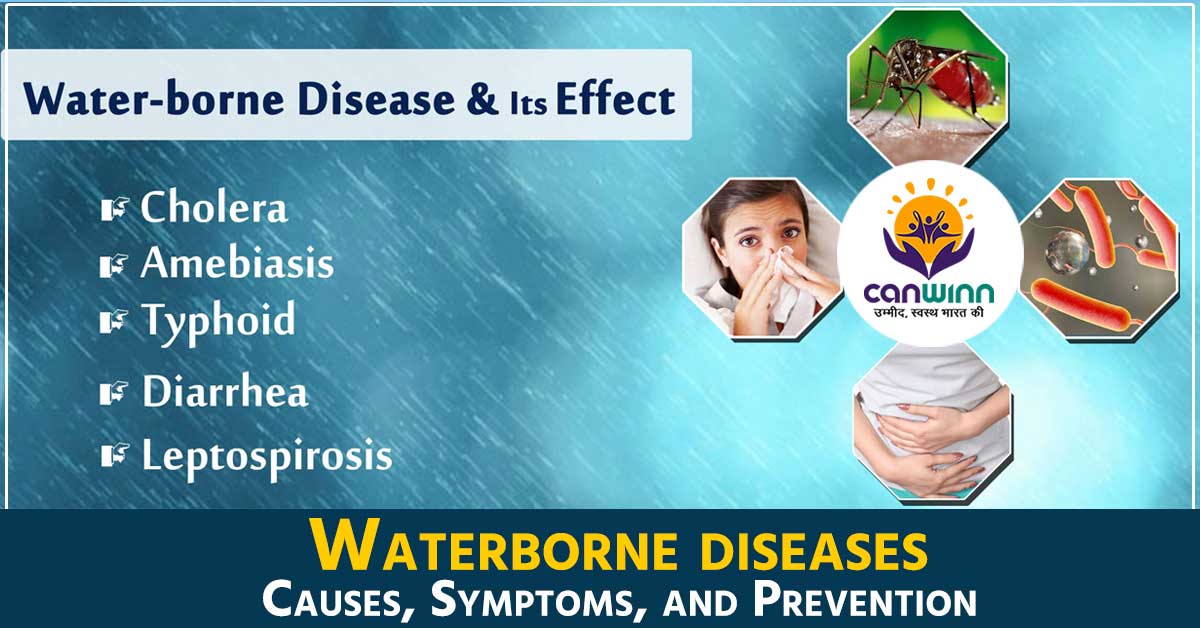Waterborne diseases are primarily caused by the pathogenic microbes that enter the human body through contaminated water. The infected water could come from drinking, food preparation, or washing clothes. For instance, many countries do not have proper water treatments that make it easy for water-borne diseases to develop. There are many water-borne diseases that can occur but the most common disease of them is Diarrhea.
What Are Waterborne Diseases?
Diminutive organisms like bacteria or viruses are the ones that cause waterborne disease. They enter through contaminated water or by coming in contact with feces. A proper sanitization and hygiene can prevent the diseases that infected water can spread.
What are the Causes of Waterborne illnesses?
Commonly, water-borne diseases can be caused by:
Pollution: This will include nitrates, dangerous levels of chemicals, or heavy metals in the water supply. This particularly happens due to industrial pollution or the over-use of agricultural chemicals.
Dirt & Contamination: Tiny organisms like viruses, bacteria’s, and parasitic are responsible to contaminate water without showing any visible. Mostly, water becomes infected when it comes in contact with animal and human waste. For, instance, only one gram of feces can contain up to 100 billion microbes.
Generally acknowledged waterborne infections are:
- Cryptosporidiosis (Cryptosporidium)
- Cyclosporiasis (Cyclospora spp.)
- Escherichia coli O157: H7 Infection (E. coli O157)
and Hemolytic Uremic Syndrome (HUS) - Giardiasis (Giardia)
- Harmful Algal Blooms (HABs)
- Hot Tub Rash (Pseudomonas Dermatitis/Folliculitis)
- Legionellosis (Legionella)
- Naegleria fowleri and Primary Amebic Meningoencephalitis
- Norovirus Infection (aka Norwalk virus, calicivirus, viral gastroenteritis)
- Shigellosis (Shigella)
- Swimmer’s Ear (Otitis Externa)
- Swimmer’s Itch (Cercarial Dermatitis)
Water-borne diseases: Causes and Prevention
The diseases that can develop from contaminated water are given below. Water-borne diseases symptoms, causes, and prevention are also mentioned below.
1) Typhoid Fever
The highly contagious Typhoid fever is generally spread through unsafe water, contaminated food, and poor sanitation.
- Symptoms of Typhoid
- Slowly progressing fever
- Muscle aches
- Fatigue
- Sweating
- Diarrhea or constipation
Prevention
Avoid drinking unsafe water and drink water from the sealed bottles. Also, abstain from eating foods from hygienic places.
2) Cholera
The areas where poverty and poor sanitation are rampant, cholera disease can be easily seen there. Again, the main cause of this waterborne condition is contaminated water. It causes severe dehydration and diarrhea.
- Symptoms of Cholera
- Nausea
- Vomiting
- Diarrhea
- Muscle cramps
Prevention
To prevent this waterborne illness, you should:
- Wash your hands frequently
- Eat properly cooked food
- Drink safe water
- Eat peeled-off fruits like banana, oranges
3) Giardia
The cause of Giardia is contaminated water. This is mostly through ponds and streams and sometimes the town’s water supply or swimming pools. This waterborne disease is caused by a parasite.
- Symptoms of Giardia
- Abdominal pain
- Cramps and bloating
- Diarrhea
- Nausea
- Weight loss
Prevention
For waterborne disease infection preventions can be:
- Wash your hands with soap and water
- Don’t swallow water while swimming
- Drink sealed water
4) Dysentery
Dysentery is an intestinal infection that is marked by severe diarrhea as well as blood or mucus in the stool. Bacteria, viruses, or parasites in unsafe food and water can cause this waterborne condition. Similarly, if the person comes in contact with fecal matter, it can cause dysentery.
- Symptoms of Dysentery
- Stomach cramps and pain
- Diarrhea
- Fever
- Nausea
- Vomiting
- Dehydration
Prevention
This disease mainly spreads due to poor hygiene, thus, you must maintain hygiene to prevent water-borne disease. Moreover, follow the given below points:
- Frequently wash your hands
- Do not drink juice with ice from the street corners
- Avoid eating food from street vendors
5) Escherichia Coli (E. coli)
The main cause of Escherichia Coli is E. coli bacteria. The animal waste or strains of E. coli in producing farmland spreads through the process of making ground beef. Thus, when the person consumes this food, he/she could experience symptoms of the waterborne illness. This bacteria can be presented in unsafe water sources.
Prevention
- Avoid contaminated water
- Avoid drinking water from ponds, rivers, and swamps
- Wash fruits and vegetables before eating
- Drink plenty of safe water
6) Hepatitis A
This is a liver infection that occurs when you consume infected food and water. Coming into contact with an infected person can also spread and cause Hepatitis A.
- Symptoms of Hepatitis A
- Fatigue
- Clay-colored bowel movements
- Jaundice
- Nausea and vomiting
- Abdominal pain, especially near your liver
- Loss of appetite
- Sudden fever
Prevention
The most preferable and effective way to prevent hepatitis A is a Vaccine. Therefore, vaccinate against Hepatitis A to prevent this condition occurrence.
- Eat properly cooked and hot food
- Don’t eat food at room temperature
- Don’t eat from food vendors
- Do not eat raw meat
In conclusion, maintain proper hygiene and avoid consuming contaminated food and water to stay safe from waterborne infections.
Stay connected with Canwinn Foundation!



